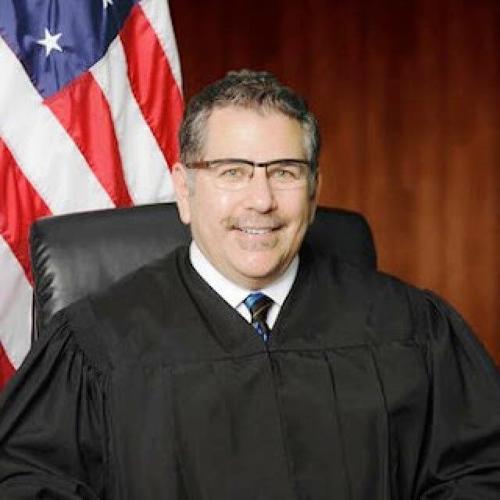
Cook County Circuit Judge Michael Forti
CHICAGO - A 60-year-old man who has been held in the Cook County Jail for nearly three years despite facing no criminal charges will need to remain there, a state appeals court has ruled, because he can't prove to the courts that he doesn't actually have $10 million to pay his ex-wife, as a Cook County judge ordered him to do.
On June 24, a three-justice panel of the Illinois First District Appellate Court backed the decision of Cook County Judge Michael Forti to keep that man, Steve Fanady, in custody under a civil contempt order.
The ruling was authored by Justice Margaret Stanton McBride. Justices Rena Van Tine and Nathaniel Howse concurred in the ruling. The decision was issued as an unpublished order under Supreme Court Rule 23, which may limit its use as precedent.
Fanady has been in the county jail since June 28, 2022, when Forti ordered him jailed based on a determination that Forti has essentially refused to pay $10 million in stock to Fanady's ex-wife, Pamela Harnack.
Harnack filed for divorce from Fanady in 2008, seeking to end their marriage of five years. Their divorce was finalized in 2011.
Fanady and Harnack had no children.
According to court documents, Fanady initially cooperated with the proceedings, but then stopped. The divorce decree, for instance, was entered on Aug. 3, 2011, following a hearing which Fanady did not attend.
Under that decree, the court determined Fanady to be worth about $7.3 million. The court found that the couple's marital property included 320,000 shares of stock through the Chicago Board of Options Exchange (CBOE). The court determined Fanady held 280,000 of those shares exclusively, through various corporate entities.
The court ordered that 140,000 of those shares should belong to Harnack.
However, in the months leading up to that hearing, Fanady was sued by a former business partner, who claimed Fanady had breached a contract by improperly withdrawing some of those CBOE shares without compensating them.
The court awarded the 120,000 shares to them. The court found Fanady had "already transferred and received the shares to which he was entitled from the partnerships."
The ruling came over Harnack's objections.
In that 2017 ruling, the court found "Harnack 'should not benefit from her husband's bad acts' or 'from her own misunderstanding or misrepresentation as to the number of shares of CBOE Holdings which were in the marital estate.'" The court further said Harnack "was required 'to chase Mr. Fanady for her just share of the marital estate.'"
Harnack then also lost on appeal against Fanady's former business partners.
Following that loss, Harnack returned to divorce court, asking the divorce judge to enforce the judgment and order Fanady to pay her the equivalent of those 120,000 shares, plus interest, dividends and anything else Fanady may have earned while he held the stock.
While that lawsuit was still pending, the Cook County divorce court ordered CBOE and others to transfer 120,000 shares of CBOE stock to Harnack. CBOE, however, responded in court by asserting it could not do so, because Fanady's account only contained 120,000 shares of the stock and, with legal actions pending, CBOE could not legally say to whom those shares belonged.
Fanady asserted Harnack had "knowingly deceived the trial court as to the size of the marital estate."
Fanady's assertions were backed by the finding of the trial court that ruled in favor of Fanady's former business partners in their dispute with Harnack. In that 2017 ruling, Cook County Associate Judge David Haracz explicitly stated Harnack misled the divorce court into creating a dissolution of marriage judgment that conflicts with both the former couple's financial reality and Illinois law.
Harnack nonetheless won before both Judge Forti and on appeal in her continued divorce proceedings against Fanady.
In an earlier decision, appellate justices said Fanady's misfortune is his own fault, because he did not participate in the divorce court proceedings as he should have. They said any misunderstanding concerning the number of CBOE shares Fanady held would have been cleared up years earlier, if he had participated in the divorce court proceedings.
Despite losing in court, Fanady has not paid the money to Harnack as ordered by the court.
Fanady continues to assert he does not have the money to pay.
According to court documents, much of the dispute in recent months has centered on a blind trust in the Central American nation of Belize, in which Fanady said his assets had been held. According to court documents, Fanady told the court that for years, the trust paid him a sum, like an annuity, providing him living expenses for a year and money to finance his legal defense.
Harnack's lawyers and Forti indicated Fanady should seek to use funds contained in that foreign trust to satisfy the court orders.
However, Fanady has since claimed that trust ran out of money and has been dissolved.
He further presented the court with letters from the trustees administering the trust refusing to release any money to satisfy Forti's orders, even if the funds in the trust were sufficient, as the trustees allegedly asserted the disbursement requests were improperly made "under duress."
And Fanady has repeatedly asserted he never had $10 million, but only $2.9 million, at most, from the sale of any CBOE shares he may have held.
Forti, however, has flatly rejected all of Fanady's claims, saying he believed Fanady was lying to the court and continuing to conceal assets in an attempt to avoid paying his ex-wife, even as Fanady has asserted his health has declined while in custody, including periods in solitary confinement.
Forti has said he believes the continued jailing remained "an appropriate means of compelling compliance," despite "the passage of time."
In support of that finding, in July 2024, Forti pointed to a decision from the U.S. Eleventh Circuit Court of Appeals in Atlanta, Georgia - which does not have any binding authority over Illinois courts - in which that court found "the mere passage of time is not a sufficient basis to demonstrate that (jailing) no longer has coercive purpose."
Fanady's attorney, Laura Grochocki, has said Fanady's jailing has far exceeded any previous record for the longest incarceration for failure to pay money in Illinois history.
During his jailing, both of Fanady's parents have died and he was not allowed to attend their funerals.
Grochocki has claimed Fanady's life and well-being have also been repeatedly threatened by other inmates, including inmates being held on charges of violent crime.
Fanady has never been tried or convicted of a crime, nor does he have any hope of release, until he either pays the money ordered by the court to "purge" his contempt, or persuades a judge either that the jailing has gone on long enough or that the incarceration will not be effective at securing the money.
In Ocotber 2024, Fanady again appealed to the Illinois First District Appellate Court, asserting Forti has violated his constitutional rights. His attorney has said the jailing amounts to an unconstitutional "debtors prison."
Fanady has claimed the jailing has ceased being "coercive" and is now merely "punitive," intended to punish him for not paying the money he claims he doesn't have and never actually did.
Fanady and Grochocki argued that allowing Fanady to remain in jail under Forti's orders "establishes a legal framework" that allows judges to simply throw people in jail indefinitely under civil contempt without trial or hope of release, unless they pay money the court says they must, so long as the court determines they have the funds - a power not granted to judges over even those accused of the most heinous of violent crimes.
In their latest ruling, however, the appellate panel said they did not believe it mattered how long Fanady remained in jail, so long as Judge Forti continues to believe Fanady is not being honest about his financial standing and Fanady cannot present evidence the court believes can prove otherwise.
They said they agreed with Harnack's lawyers "that nothing ... suggests that the passage of time alone is sufficient to support a conclusion that a civil contempt order is no longer coercive."
McBride and her colleagues said the documents presented by Fanady in support of his claims of insolvency were never properly "authenticated" and could be "disregarded" by the court. And they noted that Fanady did not call any witnesses to back his claims concerning the dissolution of the Belize trust and provided no financial records to show how much he had actually received from the trust.

Illinois First District Appellate Justice Margaret Stanton McBride
"Even assuming that Fanady is telling the truth about having no other income or assets, such a proposition would be insignificant when the record suggests that he previously concealed assets valued in excess of $10 million," the justices wrote. "Other than Fanady’s testimony, he provided no evidence regarding what assets were contained in the trust, and how or when those assets were exhausted."
The justices further rejected Fanady's claims that Forti had violated court rules and the law by not regularly holding hearings every 30 days concerning Fanady's jailing and his contempt status, including refusing to do so for months at a time. Fanady has also claimed many of the hearings that were held were essentially cursory, as the judge allegedly denied him the ability to speak at some of the hearings.
McBride and her colleagues, however, said those 30-day hearing requirements are not "mandatory" but rather "directory" under court rules, meaning Forti did not violate any rights afforded to Fanady under the law by not holding them every 30 days.
The justices said they believed the hearings that were held were sufficient and that any violations of such court rules would not "require his release."
The justices affirmed Forti's orders, and Fanady remains in custody at the Cook County Jail until he pays $10 million or another court intervenes.
In response to the ruling, Grochocki expressed dismay at the appellate decision and said she did not know what next legal steps may be available to Fanady to end his jailing, now at 36 months and counting.
She noted that Fanady could spend more time in jail than either former Chicago Ald. Ed Burke or former Illinois House Speaker Michael J. Madigan, both of whom were convicted on public corruption charges and sentenced to prison following high profile federal court trials.
Grochocki said she feared Fanady's jailing will result in an effective death sentence, as she said she believed Fanady may die in jail, pending his release, given his declining health and continuing time to solitary confinement.
In a statement emailed to The Record, Grochocki said:
"I’m traumatized and outraged by the Appellate Court’s decision to keep Steve Fanady in jail, especially in an unpublished opinion. To me, this is when you know there are two tiers of justice.
"... How is it just to hold a man with no criminal record in jail indefinitely over a 16-year-old property dispute, stemming from a four-year marriage with no children? How is it just to reopen a final judgment that’s over a decade old, rewrite it, quintuple the value of the asset, and then jail a man when he can’t pay? How is it just to force someone to sleep on a dining table for a year, deny him showers, sunlight, and the ability to speak to his 13-year-old daughter?
"His compliance statuses have been suspended for over a year, and no one has said a word about it. The Appellate Court didn’t fail to address this - they pooh-poohed it. Judge Forti took 20 months to 'decide' Fanady’s case and didn’t even bother to issue a written opinion. His entire ruling was a single word: 'no.' When the Appellate Court remanded the case asking why the passage of time didn’t go to the coercive effect of confinement, Forti cited a case from the 11th Circuit, S.D. of Florida—not even Illinois law.
"I didn’t know that due process could be so thoroughly violated in Illinois - or in the United States of America - but apparently, it can be."
Forti is next slated to face election in 2026.




